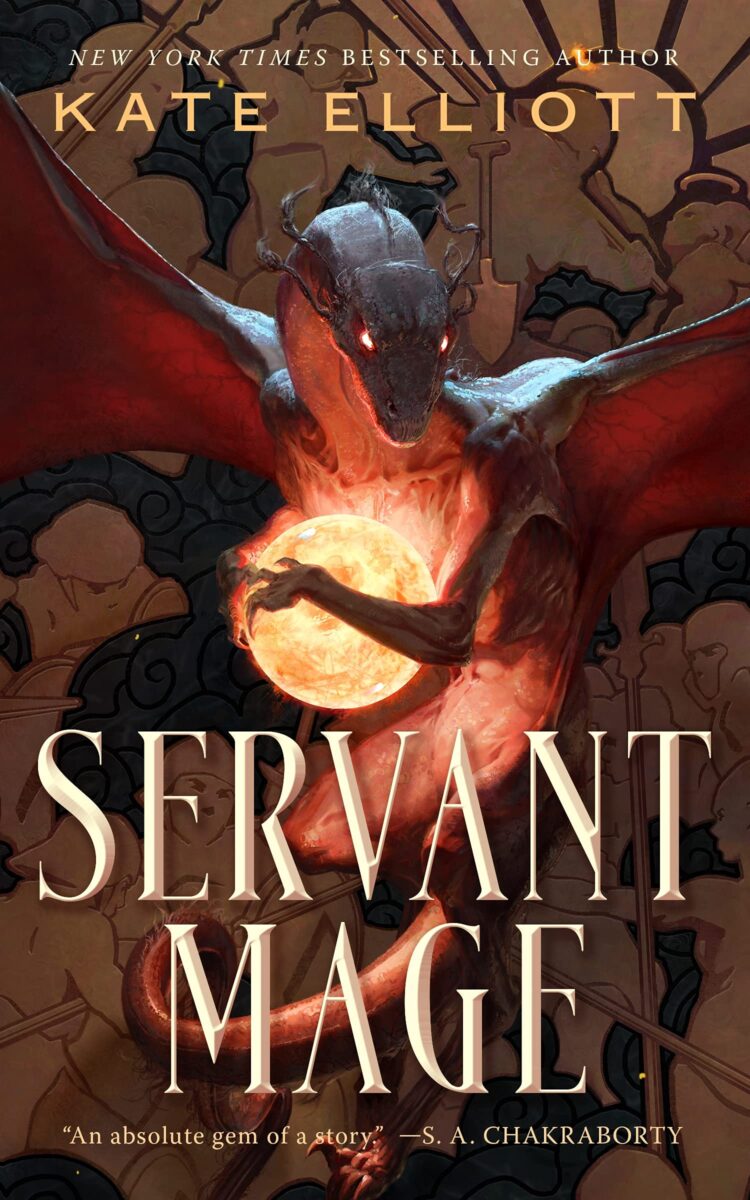You want a masterclass in worldbuilding? Look no further. Kate Elliott hasn’t been in the game for this long for nothing, and it’s clear from this brief novella that she has only grown in power. Servant Mage combines sharp insights, swift character work, and a magnificently complex world to make a story that feels both urgent and careful, a work of real thought and consideration.
We meet Fellian, the titular Servant Mage, as she heads to clean the outhouse, an unusual setup that immediately conveys her lowly position in the household she is indentured to. Ever since the revolution, mages are rounded up, minimally trained while indoctrinated, and then shipped off to serve in whatever capacity the government sees fit to assign. The veneer of “liberation” has worn very thin for most mages, but for Fellian it was never anything but a lie. She’s already been resisting the new order by teaching others to read and write, so when Monarchist rebels arrive at her doorstep, she’s willing enough to be drawn into their schemes.

The Monarchists want to rescue rebels trapped in a mine, for which they need her skills as a Lamp, a fire mage who can create stable knots of power to provide light and heat. But on the way, they learn of a very special child, an infant who can turn the tide of the rebellion. And the captain of their little band, a gruff but noble swordsman, is determined to seek out this little royal and keep them—and their powers—away from the other side.
If that sounds like some straightforward and 90s-esque fiction, think again. There may be just enough of the “lost heir” talk and noble underdog vibes to lull you into thinking you know the score, but you don’t. This isn’t a battle between Good and Evil, and this isn’t about a band of plucky and diverse rebels overthrowing a faceless autocracy. For better or worse, our collective conversation has moved on from that into a far less comforting grey area, and Elliott knows it. The moral high ground is just the least boggy part of the swamp.
The Monarchists are just as problematic as the Liberationists, as Fellian soon learns. Though their systems benefit her personally, and would offer her a chance to do some amount of good as well as find some amount of respite and prosperity, Fellian can’t allow herself to excuse their failings. We’re able to see others romanticizing the Monarchist and Liberationist causes, but Fellian never lets us look away from both sides’ hypocrisies, which adds to the complexity of the setting.
Elliott understands the archetypes and never lets them devolve into stereotypes. The honorable general is allowed to be both a bastion of dignity and complicit in larger systems that undermine his credibility. “A thing is not necessarily true because a man dies for it,” as Oscar Wilde said, and Servant Mage stands as an excellent illustration of why we all could stand to have a healthy suspicion of causes. Both sides talk a good game about fairness, but how do they treat the lowest in their society? How willing are they to accept difference and dissent?
Fellian is repeatedly asked to choose her allegiance, and repeatedly focuses on helping people instead. Instead of compromising, Elliott is telling us that we can reject false dichotomies and work either within them or outside of them to find a third way, a way that might not be so flashy or grand but that actually puts people first. This choice seems obvious as I describe it, but the novella makes sure there are always real stakes for Fellian to face, natural consequences of this highly realized world.
I really want more of this world, and specifically of Fellian’s home. We get glimpses, but it’s enough to know that there could be just as much complexity and energy in just this one area as there is in the whole empire. I hope we get another novella about Fellian’s further adventures, but for now I’m just glad we have this lovely, complicated little knot of a book.
